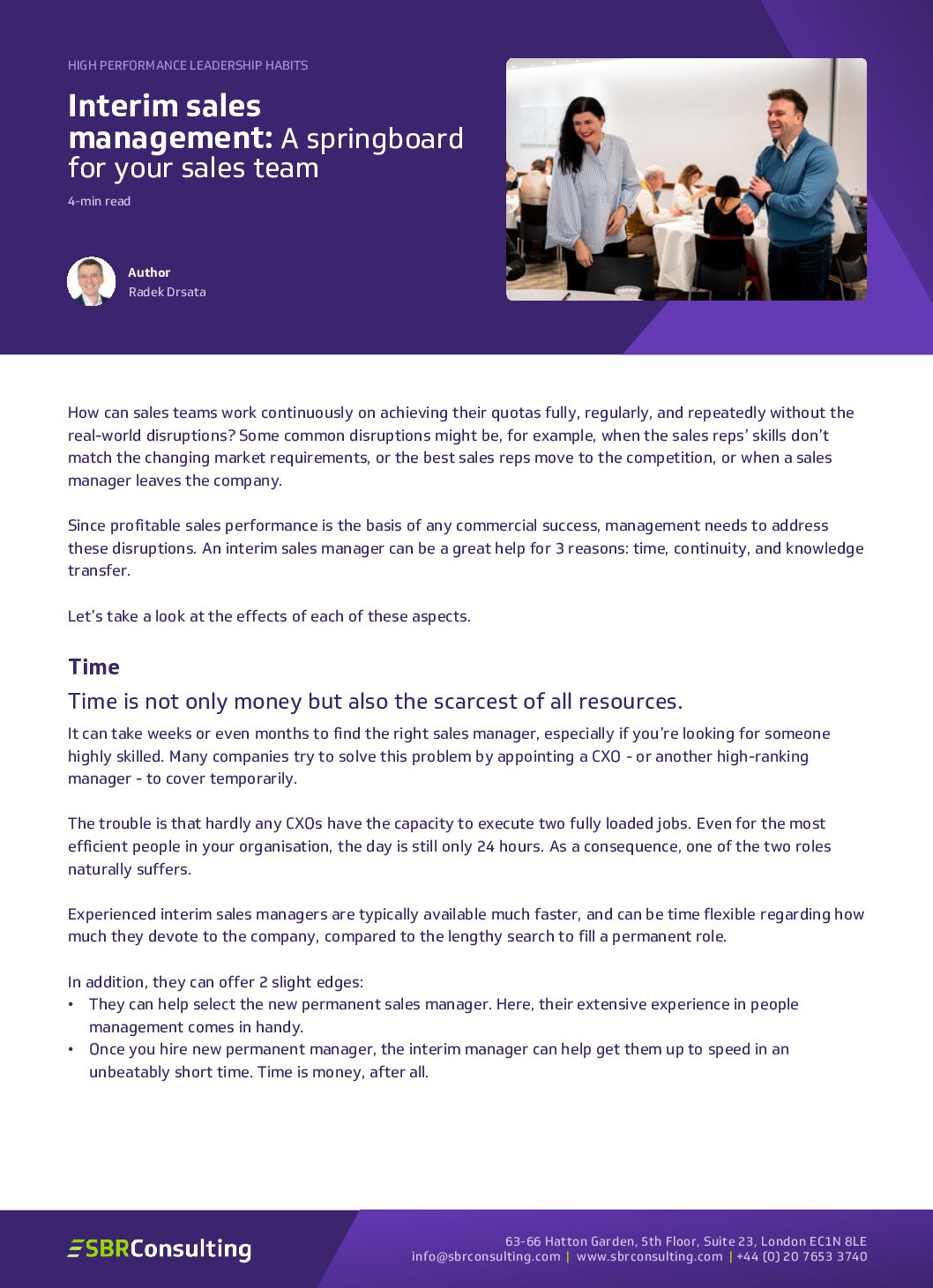
HIGH PERFORMANCE LEADERSHIP HABITS
Interim sales management:
A springboard for your sales team
4 min read
How can sales teams work continuously on achieving their quotas fully, regularly, and repeatedly without real-world disruptions? Some common disruptions might be, for example, when the sales reps’ skills don’t match the changing market requirements, the best sales reps move to the competition, or when a sales manager leaves the company.
Since profitable sales performance is the basis of any commercial success, management needs to address these disruptions. An interim sales manager can be a great help for 3 reasons: time, continuity, and knowledge transfer.
Let’s take a look at the effects of each of these aspects.
Time
Time is not only money but also the scarcest of all resources.
It can take weeks or even months to find the right sales manager, especially if you’re looking for someone highly skilled. Many companies try to solve this problem by appointing a CXO – or another high-ranking manager – to cover temporarily.
The trouble is that hardly any CXOs have the capacity to execute two fully loaded jobs. Even for the most efficient people in your organisation, the day is still only 24 hours. As a consequence, one of the two roles naturally suffers.
Experienced interim sales managers are typically available much faster, and can be time flexible regarding how much they devote to the company, compared to the lengthy search to fill a permanent role.
In addition, they can offer 2 slight edges:
- They can help select the new permanent sales manager. Here, their extensive experience in people management comes in handy.
- Once you hire a new permanent manager, the interim manager can help get them up to speed in an unbeatably short time. Time is money, after all.
Continuity
Performance is measured by numbers rather than opinions.
“When the cat’s away, the mice will play.”
The working morale of self-motivated and self-disciplined employees can vanish fast.
An interim sales manager can offer continuity of business focus, discipline, and regularity. Put simply, the interim sales manager can make sure that forecasts do not degrade to fairy tales – performance is measured by numbers rather than opinions – and forecast meetings do not mutate into open-ended discussion clubs.
People management means primarily a manager devoting time to their direct reports. Among the many studies that have examined this, there seems to be a consensus that good managers should spend at least 50% of their capacity with their team members so that the latter feel valued, respected, and advised.
Otherwise, the unwanted effects of a lack of motivation and discipline quickly creep in.
We shouldn’t neglect the client’s point of view here either. Bad news can spread fast, and no customer wants to buy if rumours suggest their supplier might be dealing with the fallout of a bad management structure.
Knowledge Transfer
The crown jewel of any interim sales management role.
Thanks to their experience and their function, an interim sales manager can boost your organisation’s view of business processes and the best practices available on the market. The temporary nature of the interim management position means they can also be great catalysts for change, taking the knowledge embedded in your organisation, enriching it with their insight, and then transferring it to the new permanent sales manager when the role is filled.
This kind of knowledge transfer can, in fact, help each sales rep adopt high-performance sales habits. These are based on building and improving sales motivation, systems and skills to pave a path to new attainments.

Each of these areas requires management, training, learning and/or coaching efforts. With the proper inputs, the combination can deliver visible results.
The position of an interim sales manager can thus grow from a straightforward bridge between two permanent sales managers to a springboard, facilitating a jump to the next level of success and self-confidence among the sales team.
To discover more about sales management, let’s talk growth.




